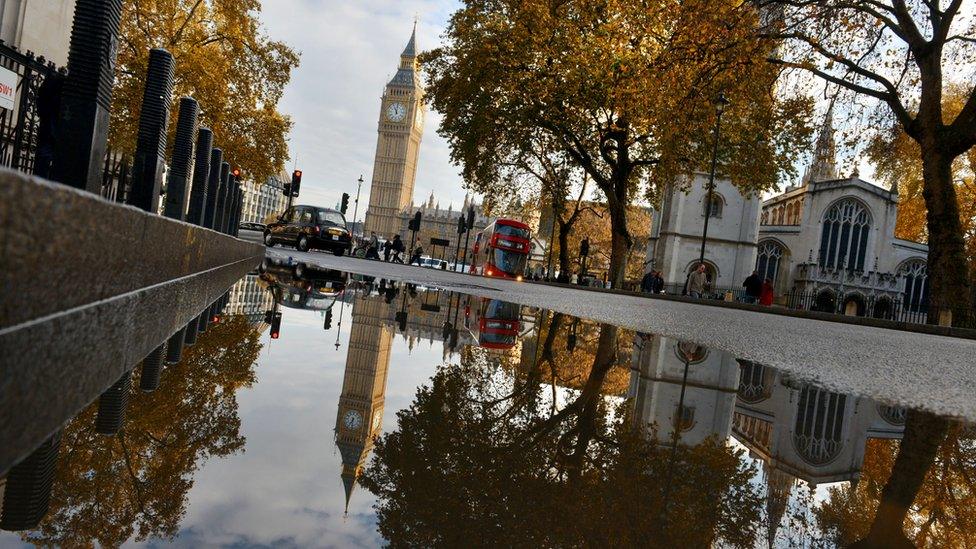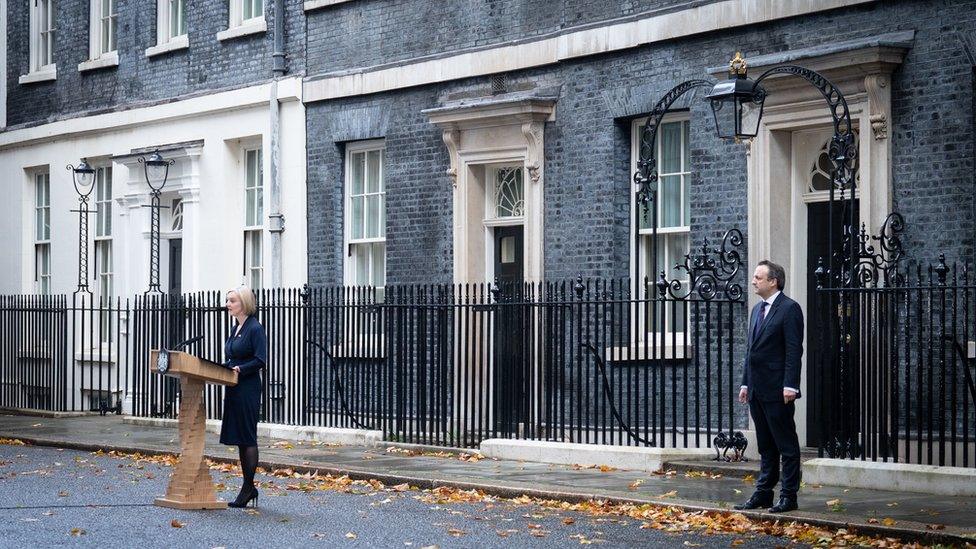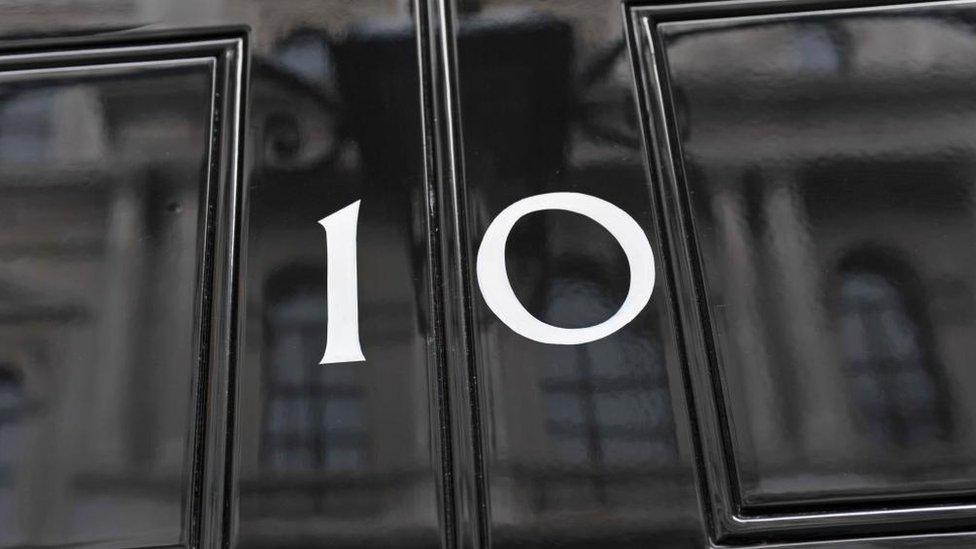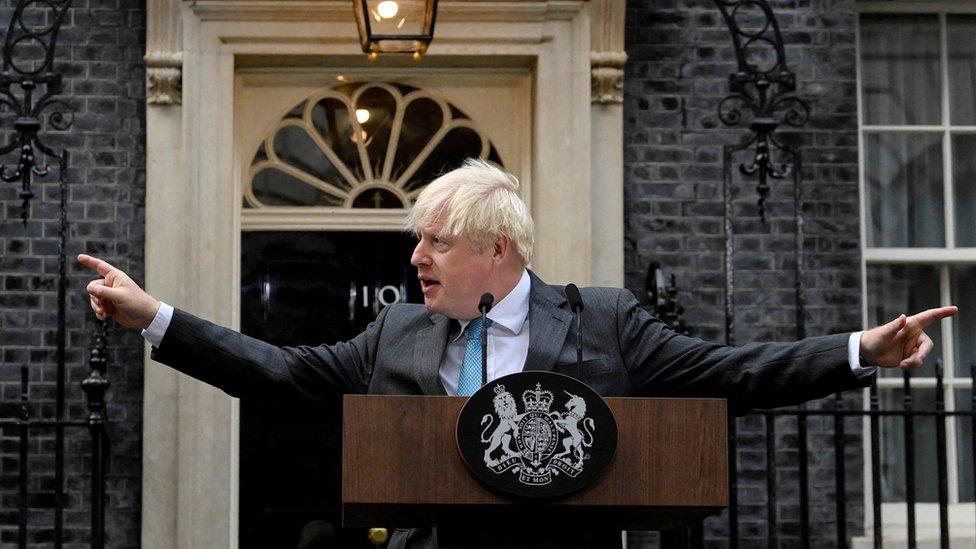What's happening in Parliament next week?
- Published

It's going to be a pretty weird week in Parliament. There's some significant law-making - on stamp duty and EU Law - but it will be completely overshadowed by the battle for the Conservative leadership.
The new PM could be anointed as early as Monday afternoon, or as late as Friday, if an online ballot of Tory members is required.
Question times and select committee interrogations will feature ministers who may not be in office a week later, or who may be auditioning for a promotion.
The new prime minister will have allies to reward, opponents to de-fang, enemies to punish and big beasts to bring in, so expect significant ministerial changes.
And how much point is there in asking about policy?

Liz Truss's departure sparked a new Conservative leadership contest
There's a big financial statement due on 31 October - the Monday after the new PM is due to emerge.
But will the new PM want the proposals now being drawn up, or even the chancellor doing the drawing-up? Or will the threat of a market backlash ensure that the new PM accepts whatever decisions Jeremy Hunt has made?
Meanwhile, Mr Hunt's arrival in the Treasury has created a vacancy for chair of the Health and Social Care Committee.
His successor must be a Conservative MP and possible contenders include former health ministers, Steve Brine, Stephen Hammond and James Morris, plus Victoria Atkins, a former Justice Minister, and GP Dr Luke Evans. The election is on 2 November.
Monday 24 October
Commons: (14:30) Education Questions, starring new secretary of state Kit Malthouse, probably to be followed by the usual post-weekend quota of government statements and urgent questions.
The main business is financial measures - the allocation of £60bn to the business department to fund the energy price-capping scheme, and reductions to Stamp Duty Land Tax - one of the few measures surviving from the September mini-Budget.
Westminster Hall: (16:30) MPs debate e-petitions on the safety of Covid vaccines - e-petition 602171 calls for an "immediate and full scientific investigation" on possible links between Covid-19 vaccination and a significant increase in heart attacks. Then (18:00) on e-petition 607712 calling for the government to ditch its Human Rights Act reforms.
Committees: Levelling Up, Housing and Communities (16:00) questions new secretary of state, Simon Clarke.
Lords: (14:30) Introduction of Lord Simon Murray, a barrister and Conservative councillor, who has been appointed a Home Office Minister. Questions include an intriguing one from Labour peer and member of the Benn dynasty, Viscount Stansgate, asking whether the government has any plans to amend the 1937 Regency Act...
The main debate is Committee and Report Stage consideration of the Energy Prices Bill.
There's also a Labour regret motion against the Universal Credit (Transitional Provisions) Amendment Regulations because they do not do enough to prevent claimants from financial hardship.
Tuesday 25 October
Commons: (11:30) Business Energy and Industrial Strategy questions.
10-Minute Rule Bill: Conservative Craig Mackinlay wants to require pharmacies to label prescription drugs with the with the price of the drug.
The main debate is the Second Reading of the Retained EU Law (Revocation and Reform) Bill. This sets a sunset date after which all the EU law accumulated in Britain over four decades of membership will lapse at the end of 2023.
There wasn't time to go through it all, clause by clause at the time of Brexit, so most of it was kept in place by a kind of legal shoring up manoeuvre, to allow it to be considered at leisure. The bill gives ministers sweeping powers to rewrite it.
Westminster Hall: (09:30) Jill Mortimer leads a debate on baby loss and safe staffing in maternity care.
Committees: Environment, Food and Rural Affairs (14:30) probes the die-off of marine life off the Yorkshire coast.
Digital, Culture, Media and Sport (10:00) launches its inquiry into safety at major sporting events with a session on fan personal safety, accessibility, and freedom from discrimination.
Lords: (14:30) Peers begin their consideration of the detail of the highly controversial Northern Ireland Protocol Bill. Issues are not normally pushed to a vote at Committee Stage, but the cross-party alliance of peers opposing the bill plan a procedural motion asking for more information to be given between Committee and Report. This is partly to demonstrate that they have the power to delay the next stage of debate unless their conditions are met.
Wednesday 26 October
Commons: (11:30) Half an hour of Women and Equalities Questions, followed, at noon by what may be Liz Truss's final Prime Minister's Question Time, or even the debut of her successor.
10-Minute Rule Bill: The Conservative Robert Halfon presents a bill to cut long waiting times on utility and other service providers helplines; this would be backed up with financial penalties.
That's followed by detailed consideration of the Identity and Language (Northern Ireland) Bill, which creates commissioners to safeguard Northern Ireland's different cultural and linguistic identities.
Westminster Hall: (14:30) Former minister Damian Hinds has a debate on online harms.
Committees: Northern Ireland Affairs (09:30) question the Police Service of Northern Ireland Assistant Chief Constable Mark McEwan and Detective Chief Superintendent Andy Hill on their responses to paramilitarism.
Transport (09:30) has a session on self-driving vehicles and Home Affairs (09:45) hears from Immigration Minister, Tom Pursglove MP, on the current situation with illegal Channel crossings.
Lords: (15:00) Questions (40 minutes) and if the Commons has agreed reductions in Stamp Duty, peers will be asked to rubber stamp them.
The main event is Report Stage consideration of the Seafarers' Wages Bill - which will enforce the minimum wage in UK waters. Issues include how the implementation of the act is monitored and moves to widen the categories of vessels covered. At least one vote is expected.
Thursday 27 October
Commons: (09:30) Cabinet Office Questions with Nadhim Zahawi, followed by the weekly statement on the Commons agenda for the coming week, from the leader of the Commons (and possible prime minister), Penny Mordaunt.
The main event is a Backbench Business Committee debate on the National Food Strategy and Food Security led by Conservative former cabinet minister Esther McVey and Labour's Kerry McCarthy.
That's followed by a debate on guaranteeing the right to maintain contact with people in care, led by Labour's Dan Carden, the Conservative Tracey Crouch and the Lib Dem Daisy Cooper.
Westminster Hall: (15:00) A debate on World Menopause Day.
Lords: (11:00) Backbench debates: First a debate to mark the 50th anniversary of the expulsion of Asians from Uganda, led by Lord Popat who arrived in the UK from Uganda in 1971, at the age of 17. Then peers debate the report from the Communications and Digital Committee: Free for all? Freedom of expression in the digital age.
Friday 28 October
Commons: (09:30) More second reading debates on private members bills - new laws proposed by individual MPs, beginning with Sir Mark Hendrick's Co-operatives, Mutuals and Friendly Societies Bill.
Labour's Yasmin Quereshi has yet another employment-related bill, the Employment Relations (Flexible Working) Bill.
Third is the Child Support Collection (Domestic Abuse) Bill, from Sally-Anne Hart.
It's just possible the Green Party's Caroline Lucas may have the chance to speak on her Countryside and Rights of Way Act (Amendment) Bill.
Lords: (10:00) Second Reading debates on private members bills proposed by peers: Government of Wales (Devolved Powers) Bill proposed by Plaid Cymru's Lord Wigley; the Coroners (Determination of Suicide) Bill [HL] from the Bishop of St Albans and the Women, Peace and Security Bill from Baroness Hodgson of Abinger.
Finally there's Lord Alton of Liverpool's Genocide Determination Bill - the latest iteration of a long-running campaign aimed at China's actions against the Uighur people in Xinjiang. The bill would provide for the High Courts in England and Wales, and in Northern Ireland, and the Court of Session in Scotland, the power to make preliminary determinations as to what constitutes genocide.
Lord Alton has raised the subject of genocide more than 300 times in the House of Lords, and has introduced amendments which would have a similar effect, to other legislation, coordinating with sympathetic MPs in the Commons.
Related topics
- Published21 October 2022

- Published23 October 2022

- Published2 February 2024

